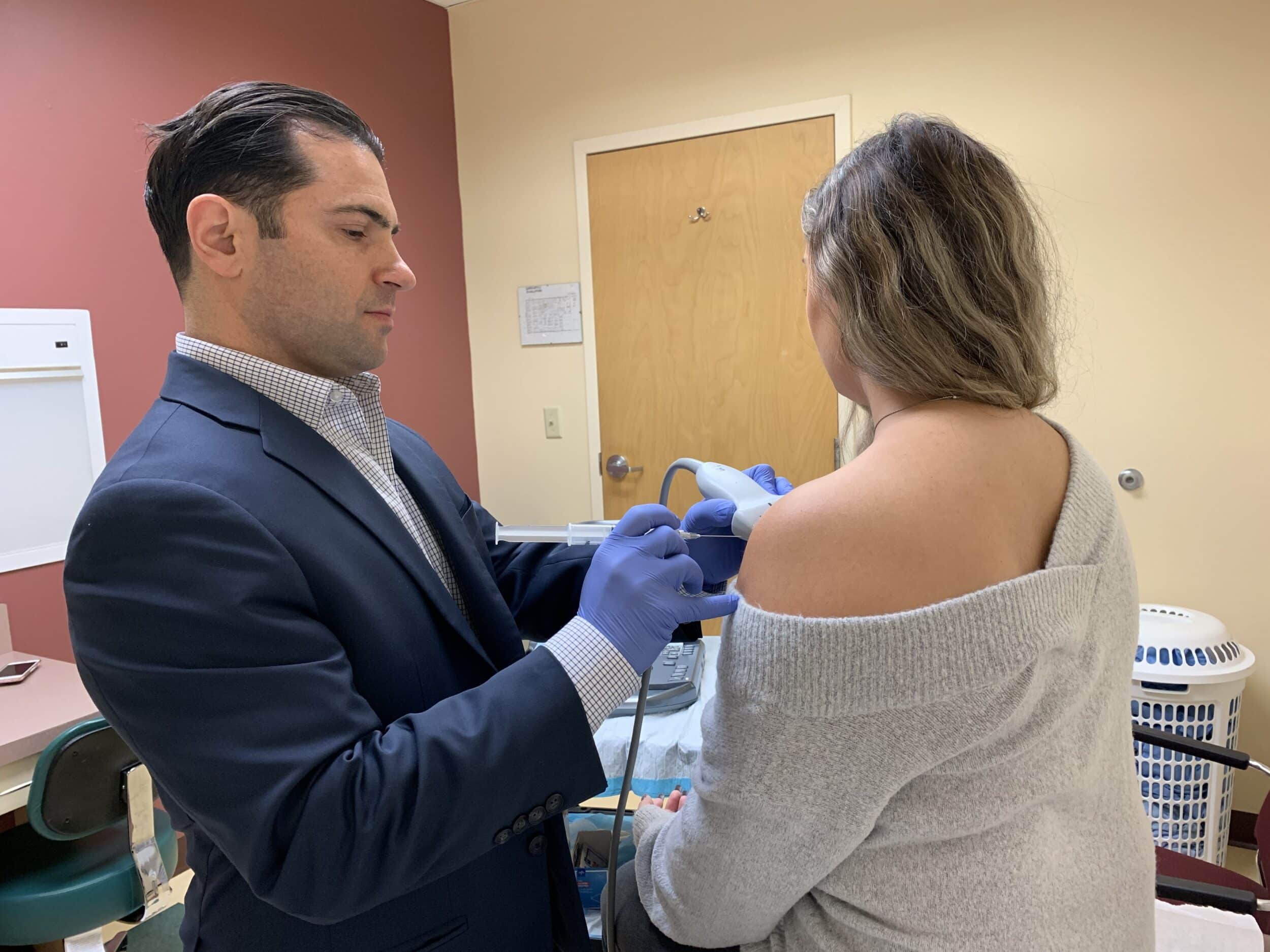Biceps tendinosis is a degenerative condition of the two tendons that connect the biceps muscles, the muscles at the front of the upper arms, to the shoulder bones. One of these, the long head biceps tendon, runs from the muscle to the labrum, the layer of cartilage that deepens and cushions the socket to help stabilize the shoulder joint. The condition is usually the result of an athletic injury or due to the natural aging process and can be very painful.

Biceps Tendonitis
What Are the Causes of Bicep Tendonitis?
Biceps tendinosis is typically found in patients who have also experienced biceps tendinitis, which occurs when the tendon around the biceps muscle is inflamed. Biceps tendinosis is typically characterized by deep aches and pain within the shoulder, which may worsen when the arm is lifted over the head.
Biceps tendinosis is diagnosed by evaluating the patient’s medical history, the severity of the symptoms and the overall range of motion in the shoulder. Conservative treatments are usually effective for this condition. These may include ice packs to reduce swelling and pain, anti-inflammatory medications, physical therapy, corticosteroid injections and avoiding activities that require overhead motions. If symptoms persist after 3 months of conservative therapies, a biceps tenodesis procedure to relieve pain and restore full function to the arm may be necessary. This surgery is most often performed as part of a more extensive shoulder operation, such as the repair of a rotator cuff.
What Are the Symptoms of Bicep Tendonitis?
Bicep tendonitis is a type of tendinopathy, which is a broad term used to describe any disorder that results in pain or damage to a tendon.
Bicep tendonitis is a relatively common condition that can occur in people of all ages. It's seen more often in middle-aged adults, particularly those who participate in overhead activities, such as tennis or weightlifting.
Our team at Orthopedic Associates of Long Island can educate you on what to look for to determine if you need to be seen by a doctor. Some of the symptoms of bicep tendonitis include:
- Pain located in the front of the shoulder that radiates down the arm
- Weakness in the arm
- Tenderness or soreness when the affected area is touched
- Swelling or inflammation around the tendon
- Cracking or popping sounds when moving the arm
If you notice any of these symptoms, it is essential to see your doctor so they can diagnose the issue properly and develop a treatment plan.
How is Bicep Tendonitis Diagnosed?
Your doctor will ask about your symptoms and medical history. They will also do a physical exam, during which they will check for tenderness, swelling, and weakness in the arm.
Your doctor might also use imaging tests, such as an X-ray or MRI, to get a better look at the condition of your shoulder. These tests can help rule out other potential causes of your symptoms, such as a rotator cuff tear.
What Are My Treatment Options for Bicep Tendonitis?
The goal of treatment for bicep tendonitis is to reduce pain and inflammation while allowing you to continue using your arm.
Our doctors at Orthopedic Associates of Long Island in New York may recommend a combination of the following treatments:
- Resting the shoulder and avoiding activities that aggravate the condition
- Applying ice to the affected area to reduce pain and swelling
- Taking over-the-counter pain medications, such as ibuprofen or aspirin
- Using a sling or other type of support to keep the arm from moving
- Physical therapy to both stretch and strengthen the muscles and tendons around the shoulder
- Steroid injections to reduce inflammation
- Surgery to repair or even remove the damaged bicep tendon
What Happens if Bicep Tendonitis is Left Untreated?
If bicep tendonitis is left untreated, the condition can worsen and lead to significant pain and disability. In some cases, the tendon may rupture or tear completely. Surgery may be needed to repair the tendon.
Bicep tendonitis is a treatable condition. With proper treatment, most of our patients are able to find relief and alleviate the issue with time.
Does Physical Therapy Help Bicep Tendonitis?
Yes, physical therapy is an effective treatment for bicep tendonitis. Physical therapy involves exercises and stretches that help improve flexibility and strength in the muscles and tendons around the shoulder. This can help reduce pain and prevent future injuries. Our doctors at Orthopedic Associates of Long Island in New York can refer you to a physical therapist if it has been determined that this may resolve your concerns without invasive procedures.
Schedule a Biceps Tendonitis Consult in East Setauket!
Call 631.689.6698 to learn more about the Biceps Tendonitis treatments offered at Orthopedic Associates of Long Island, or to determine whether you are a candidate. You can also book a personalized appointment with one of our top physicians by filling out the form in our contact page. While our main office is in East Setauket, we have locations all throughout Long Island, and we look forward to serving you!


